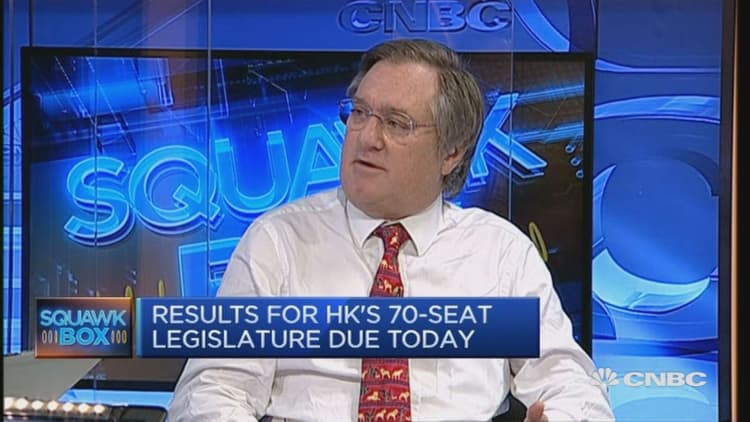Hong Kong's election results last week revealed big surprises, with several radical, young politicians now having a say over the city's governance.
Alongside Hong Kong's traditional "pan-Democrat" and pro-Beijing political camps, non-establishment figures advocating greater autonomy for the city now have seats on the former British colony's Legislative Council.
An unusually high voter turnout of 58 percent and polls open well past midnight implied an appetite for change in the politically and socially conservative Special Autonomous Region of China. These were the first major elections since the pro-democracy Umbrella Movement took over central areas of the city in 2014.
As Hong Kong's now more varied Legislative Council reflects the city's increasingly diverse political scene, CNBC takes a look at some future scenarios:
'Just another Chinese city'
Pro-Beijing politicians now hold 40 of the 70 seats on the Legislative Council.
Hong Kong is almost 20 years into a 50-year agreement between China and its former colonial ruler, the U.K., following its official handover in 1997. The city's capitalist system and general way of life is to be maintained under a "one country, two systems" approach until 2047.
But, concern over what happens when this agreement expires is emerging early, following what some perceive as China's growing encroachment on Hong Kong. Nathan Law, a leader of 2014's Umbrella Movement and one of several newly elected "self-determination" advocates, has expressed that Hong Kong may become "just another Chinese city," according to the BBC.
Roderic Wye, associate fellow of the Asia program at Chatham House, told CNBC via telephone that such an outcome perpetuates the "fear that (Hong Kong) would lose its specialness," particularly with regards to its civil liberties and rule of law.

Shenzhen tie-up?
In July this year, Hong Kong-based newspaper the South China Morning Post published an op-ed arguing for the economic viability of a merger between Hong Kong and the Chinese city just across its border, Shenzhen, which is a Special Economic Zone. Apparently, the union would result in a "gross domestic product (purchasing power parity-adjusted) of about the same size as London's."
Though Wye says that "fusion with Shenzhen is not particularly likely," Chinese Premier Li Kequiang announced in August at a State Council executive meeting that preparation for a link between the two cities' stock exchanges had been "basically completed."
Independence is a 'red rag to the Beijing bull'
Several of those newly elected on to the Legislative Council openly support independence, two of whom – Sixtus "Baggio" Leung and Yau Wai-ching – are from the localist Youngspiration party.
However, there is some doubt the activists will have a meaningful impact. "Even the most enthusiastic [proponents of the idea] know in their minds that independence is not an option," Wye told CNBC, instead describing the provocative topic as a "red rag to the Beijing bull."
A push for independence may have arisen from unrest over a growing rich-poor divide, as well as increased immigration from the mainland. Wye also cites the "frustration felt in Hong Kong with the inability to make democratic progress" and "growing uneasiness towards Beijing" as additional factors.
Chinese state news agency Xinhua have quoted the government's "resolute opposition" to Hong Kong's independence. The city's recent election was not widely covered in the mainland media.
Dr. Tim Summers, senior consulting fellow at the Chatham House Asia program and academic at The Chinese University of Hong Kong, wrote on the Chatham House website: "Expect to see more protests."
"Hong Kong will continue to face fundamental challenges of growing local resistance to central government and antipathy to mainland China among much of the population," he added.
Much the same?
Linda Li, associate provost at City University of Hong Kong, warned CNBC's Squawk Box Asia against "overstating … the change by calling it a new era of politics."
Only eight out of the 70 contested Legislative Council seats are now held by localists, radicals or student leaders.
Wye asserts that 2047 is in an "awful long time," and that he "cannot rule out substantial change." But, he says that the best outcome for the city would involve systems similar to those it currently operates under.
For Wye, Hong Kong should hope that "2047 is just another milestone along the road."

